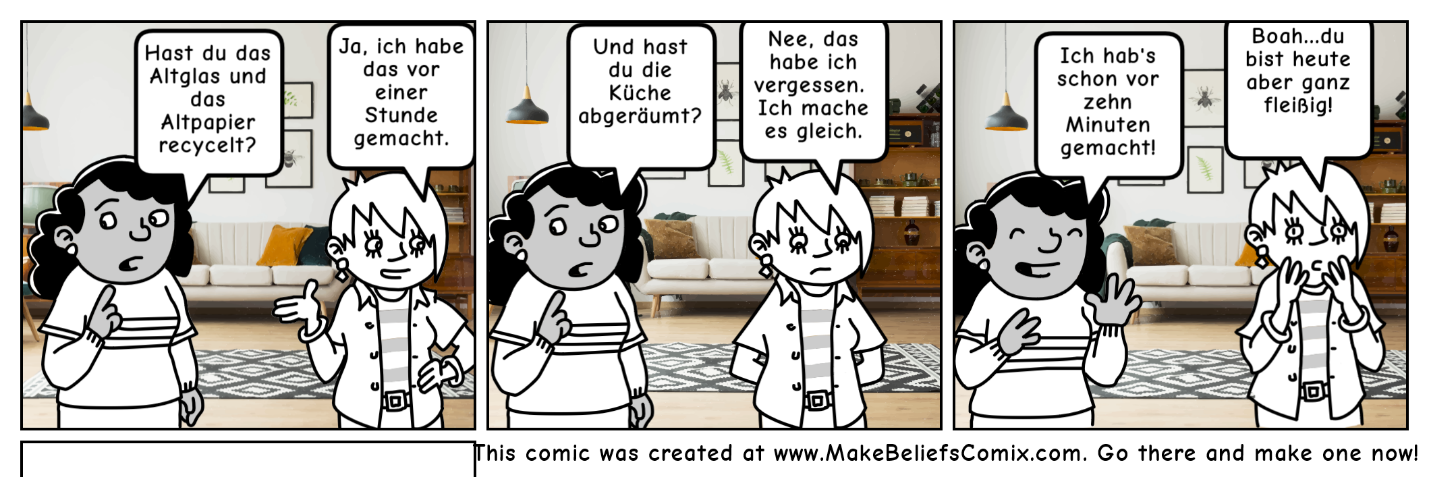1 Kapitel 7-1: Time expressions: vor, seit, schon
7-1: Time Expressions: vor, seit, schon
In Chapter 5, you learned the two-way preposition vor, which means in front of.
 NEU: It can also mean “ago” when used with time.
NEU: It can also mean “ago” when used with time.
Josephine ist vor zehn Minuten aufgestanden.
(Josephine got up ten minutes ago.)
Wir haben vor einem Monat ein neues Haus gekauft.
(We bought a new house one month ago.)
When used with time expressions, the preposition vor will always be followed by the dative case.
- vor zehn Minuten

- vor vielen Tagen
- vor fünfzehn Jahren
- vor dreißig Sekunden
- vor einem Monat
- vor einer Stunde

Ex. A: Wann haben Sie…? Beantworten Sie die Fragen in ganzen Sätzen.
- Wann haben Sie eine SMS geschrieben?
- Wann haben Sie eine E-Mail geschickt?
- Wann haben Sie angefangen, Deutsch zu lernen?
- Wann haben Sie angefangen, Englisch zu lernen?
- Wann sind Sie nach Florence gekommen?
- Wann haben Sie eine Reise gemacht?
You can also use the dative preposition seit, since the time of, to say how long you have been doing something. Compare.
- Wir wohnen seit vier Monaten in Alabama.
- (We have been living in Alabama for four months.)
- Wir lernen seit zwei Jahren Deutsch.
- (We have been learning German for two years.)
Notice that in English,  we put the verb in the past tense, but in German, the verb is in the present tense. Why? Because you are still doing these things; you haven’t stopped living in Alabama or learning German. If the verb had been in past tense in German, it would sound like you lived in Alabama and then moved or that you learned German and then stopped.
we put the verb in the past tense, but in German, the verb is in the present tense. Why? Because you are still doing these things; you haven’t stopped living in Alabama or learning German. If the verb had been in past tense in German, it would sound like you lived in Alabama and then moved or that you learned German and then stopped.
PRESENT TENSE!!!!!

As always, the dative preposition seit will be followed by the dative case.
Ex. B: Seit wann…? Beantworten Sie die Fragen in ganzen Sätzen.
- Seit wann lernen Sie Deutsch?
- Seit wann fahren Sie Auto?
- Seit wann sprechen Sie Englisch?
- Seit wann studieren Sie an dieser Uni?
- Seit wann besitzen Sie ein Handy?
- Seit wann gibt es die Bundesrepublik Deutschland?
- Seit wann gibt es die USA?
An alternative to using seit is to use the word schon. It also implies that you are still doing the action and have not stopped.  Therefore, your verb will need to be in the present tense. However, schon will be followed by the accusative case.
Therefore, your verb will need to be in the present tense. However, schon will be followed by the accusative case.
A: Wie lange wohnst du schon hier?
B: Ich wohne schon ein Jahr hier.
A: Schon so lange? Ich wohne schon drei Monate hier.
Click to watch YourGermanTeacher’s video to review seit, vor, and schon.
Quick Listening: It’s possible to use schon and seit together to emphasize the meaning “since.” Listen to Philipp, AudioLingua, demonstrate this.
- Why does he use present tense as opposed to past tense with this “schon seit” statement?
- Why does he use past tense with the last statement?
Ex. C: Wie lange machst du das schon? Sprechen Sie mit einem Partner/einer Partnerin.
- Wie lange wohnst du schon hier?
- Wie lange lernst du schon Deutsch?
- Wie lange fährst du schon Auto?
- Wie lange machst du schon Sport?
- Wie lange sitzt du schon im Deutschunterricht?

REVIEW: Nominative vs. Accusative. You’d be surprised how many students forget the difference between the nominative and accusative cases. Go through these activities by Claudia Kost and Crystal Sawatzky (University of Alberta) to review the difference before we get to the next section…which will require you to know the difference! Then do the next activity to review dative prepositions.
Ex. D: Nicos Weg: Episode 1: Lebenslinien. Watch the episode and do the online activities. In this video, you will review conversational past (das Perfekt) and the prepositions vor and seit.
https://learngerman.dw.com/de/lebenslinien/l-40553076
JUST FOR FUN: Students often hear the phrase “na ja” and wonder what it means. Watch YourGermanTeacher’s video to see five German phrases using “na.”
Ex. E: Nicos Weg: Episode 2: Angekommen. Schauen Sie sich das Video an und machen Sie die Online-übungen. You will review two-way prepositions and word order with subordinate clauses, such as weil, which you learned in Chapter 6.
https://learngerman.dw.com/en/angekommen/l-38047077
Ex. F: Heimweh. Wann haben Sie Heimweh? Was machen Sie, wenn Sie Heimweh haben? Wo haben Sie Heimweh? Wo ist Ihr Zuhause? Erläutern Sie!
Ex. G: Nicos Weg: Episode 3: Pläne machen. Schauen Sie sich das Video an und machen Sie die Online-übungen. You will review the modal verbs wollen, müssen, and möchten, which you learned in Chapter 3. You will also review word order with subordinating clauses, which you learned in Chapter 6.
https://learngerman.dw.com/en/pl%C3%A4ne-machen/l-38046791

